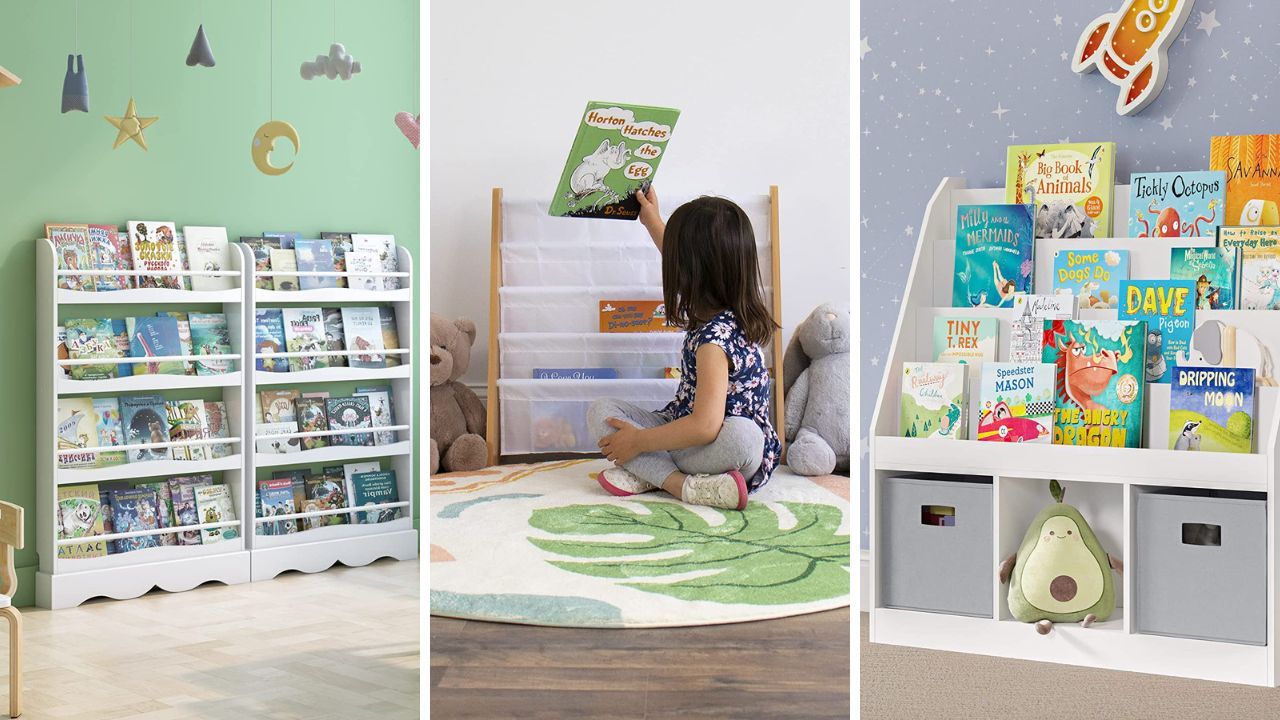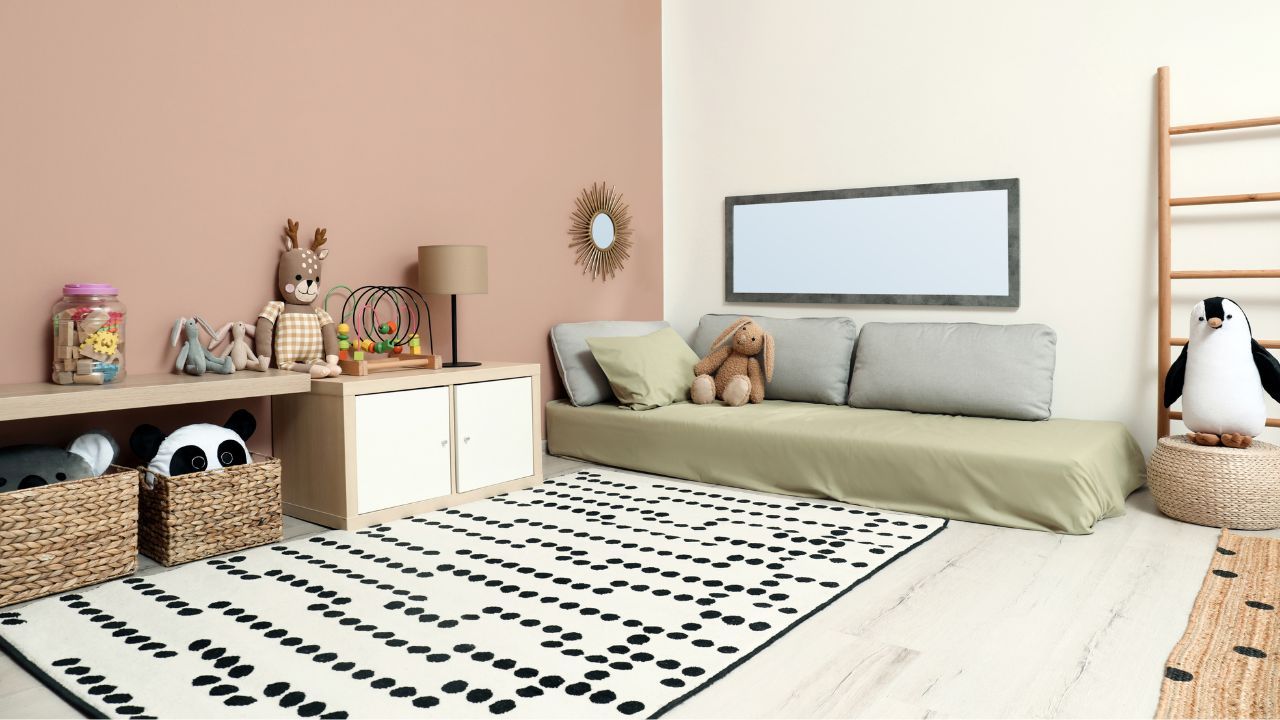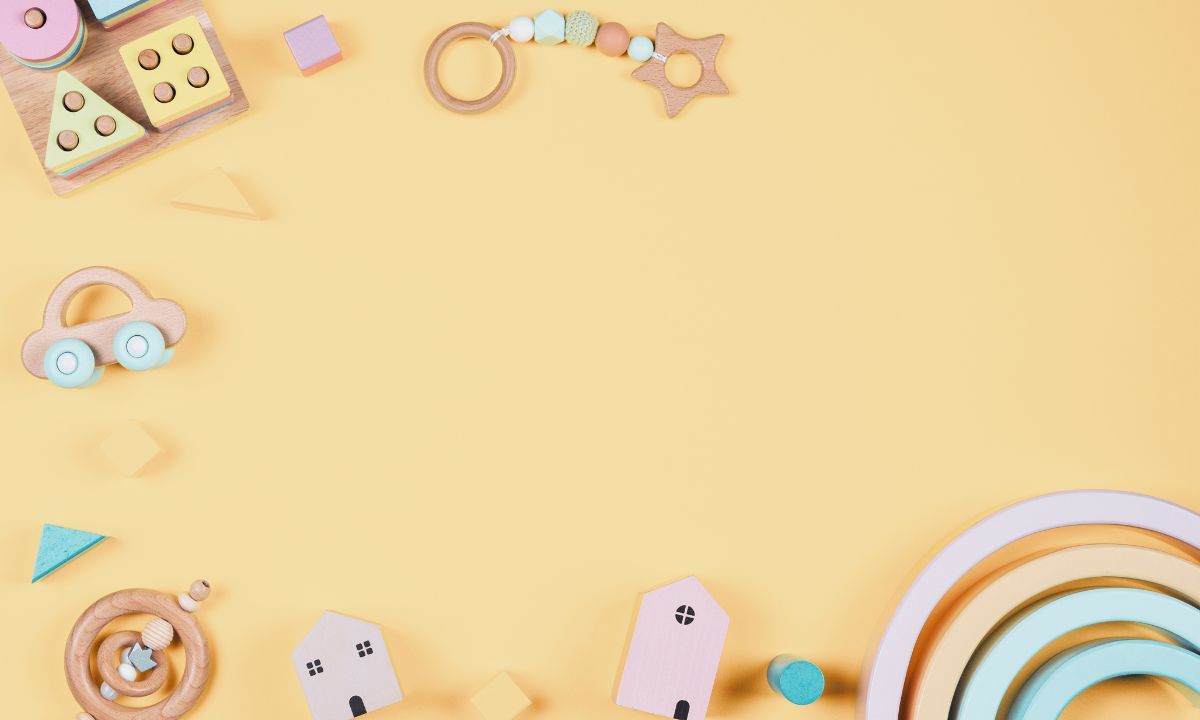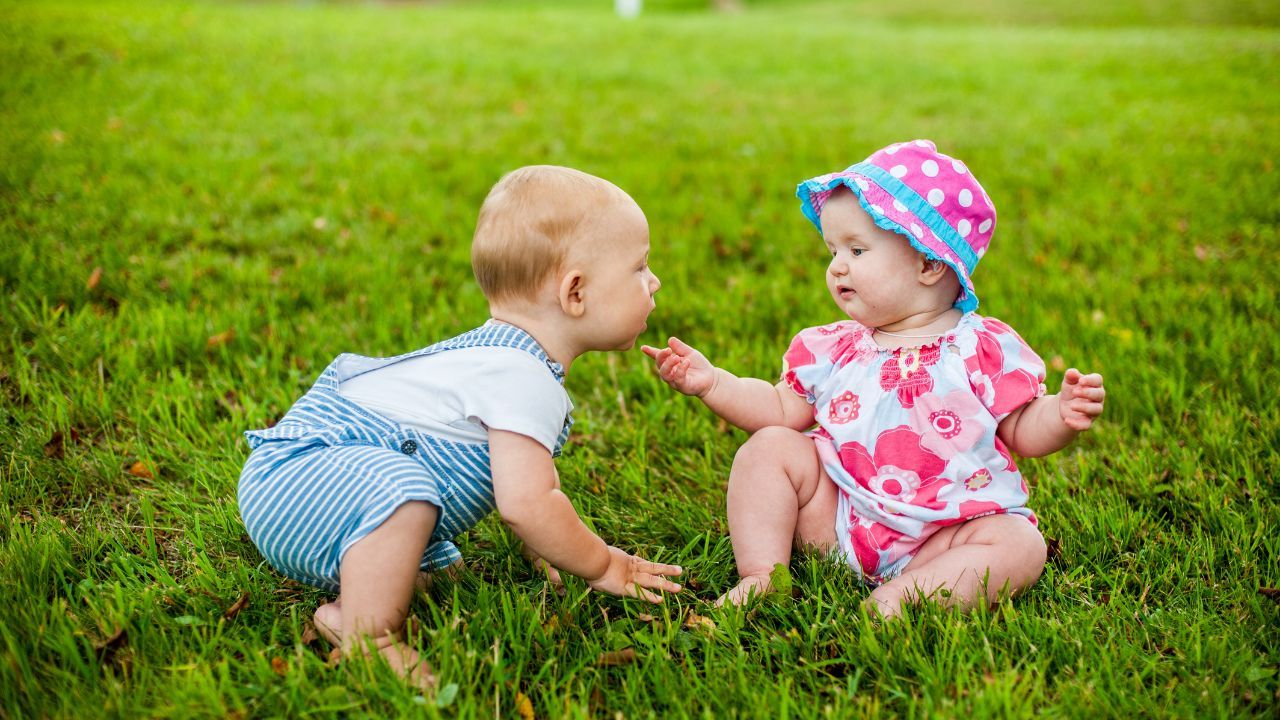
9-Month-Old Montessori Activities to Cultivate Confidence
Looking for 9-Month-Old Montessori Activities? Discover effective, fun ways to boost your baby's development.
Have you ever asked yourself how you can better stimulate your little one’s rapidly developing brain?
If so, you're in the right place! Today, we’re delving into the fantastic world of Montessori activities designed specifically for your 9-month-old bundle of joy.
At nine months old, your baby is like a sponge, soaking up experiences and learning from their environment at an astonishing pace.
Engaging them in stimulating activities not only boosts their cognitive development but also nurtures their physical, emotional, and social growth.
The Montessori method, developed by Dr. Maria Montessori, is a child-centered educational approach that emphasizes independence, freedom within limits, and respect for a child’s natural psychological, physical, and social development.
It offers a plethora of interactive, hands-on activities that cater to your child's innate curiosity and drive to learn.
Unleashing Creativity and Motor Skills
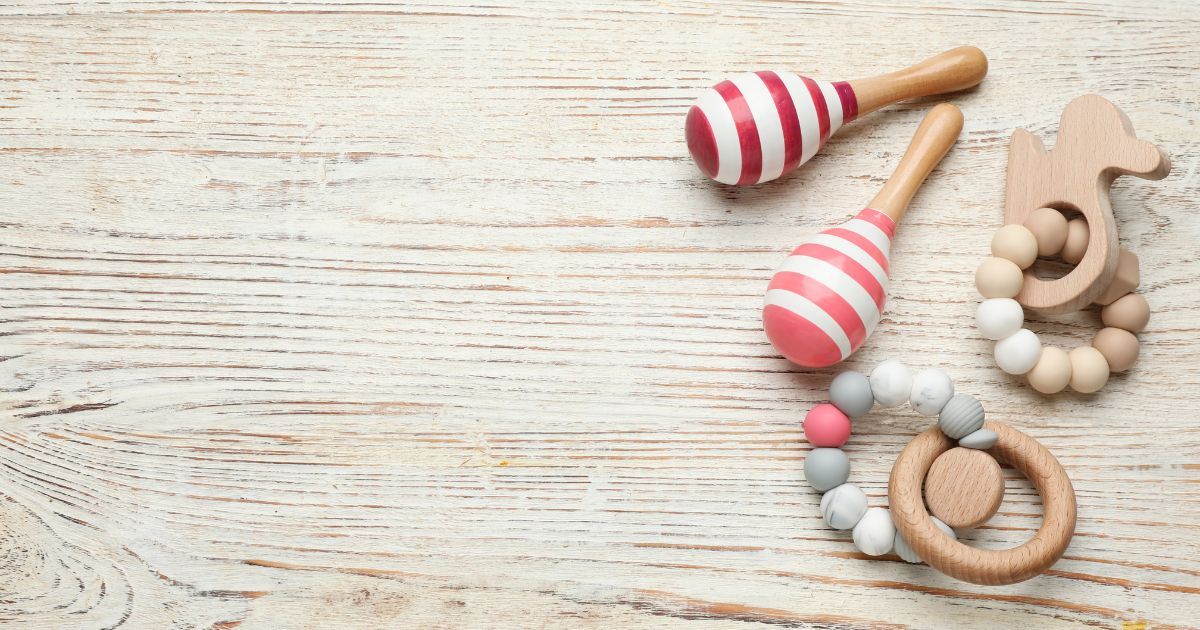
Hand-Eye Coordination Activities
Baby toys aren't just for fun—they can be fantastic learning tools too! Montessori toys are specifically designed to help babies refine their grasp.
Did you know that playing simple musical instruments can boost your baby's coordination?
Something as simple as a drum or a shaker can do wonders! As they learn to manipulate these instruments, they're also refining their motor skills and hand-eye coordination.
Fine Motor Skill Development
While it might be a bit messier, allowing your baby to self-feed is a fantastic way to develop their fine motor skills.
Start with soft, easy-to-grasp foods like cooked carrot sticks or banana slices. Remember, it's all about the experience, not how much they eat!

Many parents also choose to encourage self-feeding during their baby's developmental phase.
- One effective approach is to provide a weaning table and a chair.
- Another beneficial practice is to offer your baby a cup filled a quarter of the way with water.
By allowing your little one to grasp the cup with their tiny fingers and take a sip, you are fostering their independence and fine motor skills.
A classic Montessori toy - like stacking blocks or shape sorters, or wooden rings on a dowl is an excellent tool for developing your child's fine motor skills.
They encourage precision, control, and coordination—all while keeping your little one entertained and engaged!
Fostering Exploration and Sensory Play
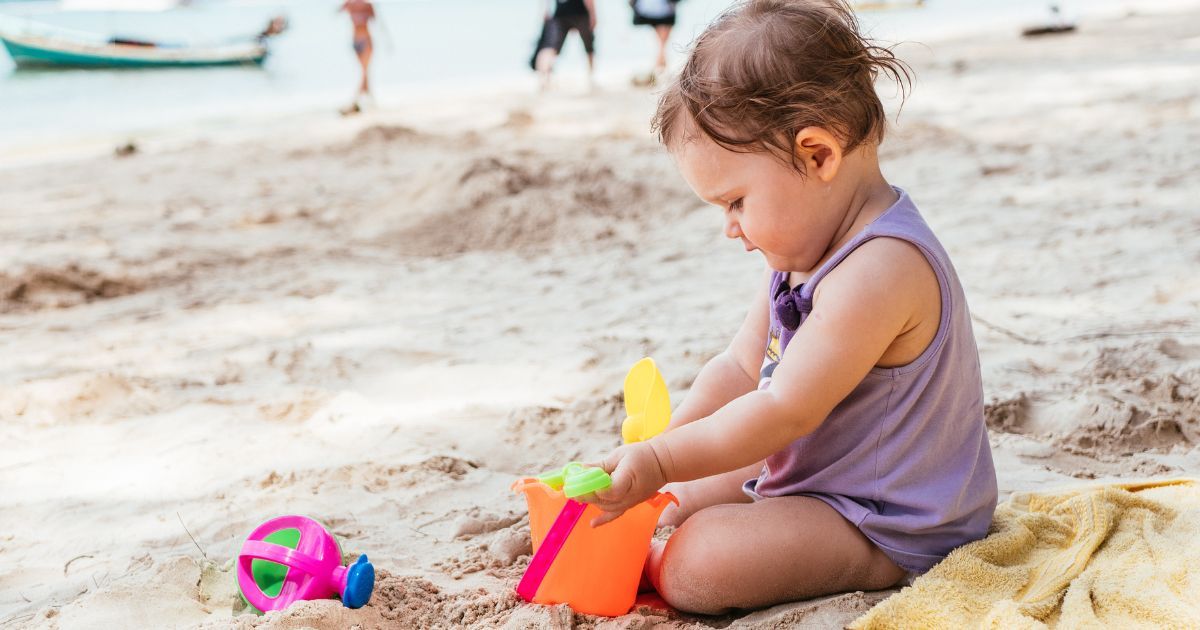
The Joy of Sensory Play
Sensory play, which stimulates your child's senses, plays a crucial role in their development.
It helps them understand their world and develops their cognitive, linguistic, and creative abilities.
For sensory play, consider Montessori baby toys that engage multiple senses.
- Soft balls with different textures.
- Colorful stacking cups.
- Musical toys with various sounds.
Outdoor Activities and Nature Exploration
There's nothing like the great outdoors to stimulate a baby's senses!
From exploring different textures in a nature sensory bin to feeling the grass under their little fingers, there are countless Montessori-inspired activities you can do outside with your baby.
Always remember to keep safety first while exploring the great outdoors together.
- Nature Hike: Plan a gentle hike with your baby in a carrier. Let them touch and feel different textures like leaves, flowers, or even mud.
- Outdoor Sensory Play: Create a mess-free painting or play with shaving cream outside for a fun sensory experience.
- Garden Exploration: Take your baby to a community garden or park. Let them explore the different plants and flowers.
- Ball Games: Play with various balls outside. Roll them to each other, practice throwing, or let your baby crawl to chase the balls.
- Watering Duty: Involve your baby in watering plants. It's a great way for them to interact with nature and learn about responsibility.
Boosting Self-Confidence and Independence
As parents, we all want our little ones to grow into confident, self-sufficient individuals.
Did you know that you can foster these traits from as early as nine months old?
Yes, indeed! By encouraging activities such as self-feeding and unrestrained play, you not only boost your baby's self-confidence but also their independence.
So, let's dive in and explore these activities!
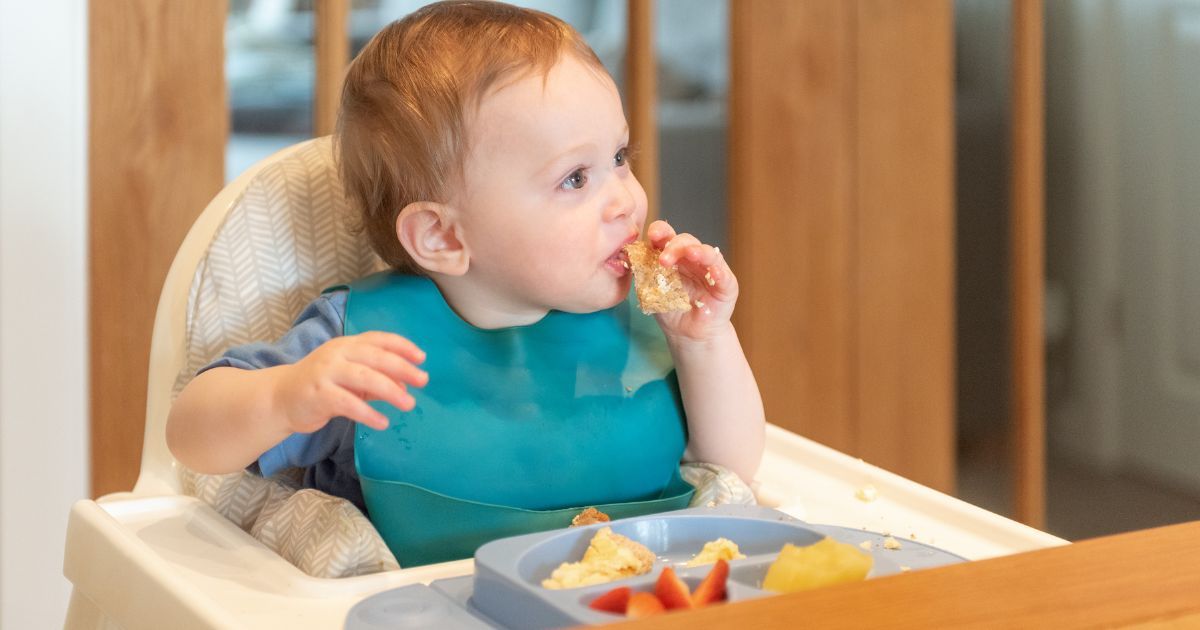
Encouraging Self-Feeding
When your baby begins to feed themselves, they start developing a sense of autonomy and self-reliance.
It's a joy to watch them figure out how to grasp the food, bring it to their mouth, and enjoy the taste. Not only does this build their self-confidence, but it also enhances their fine motor skills.
When it comes to introducing finger foods, think soft, small, and easy to swallow.
- Steamed vegetables like carrots, peas, and broccoli florets are a great start.
- Cooked pasta, soft fruits like bananas and avocados.
- Well-cooked chicken pieces are also an excellent option.
Remember, always supervise your baby during meal times to ensure safety.
Using Montessori Toys for Independent Play
Montessori toys are designed to stimulate your baby's senses and encourage unfettered play.
Some popular picks for nine-month-olds include stacking cups, soft dolls, wooden blocks, and sensory balls.
These toys not only provide endless entertainment but also aid in the development of their problem-solving skills and hand-eye coordination.
Here are some more of my favorites:
Object Permanence Box
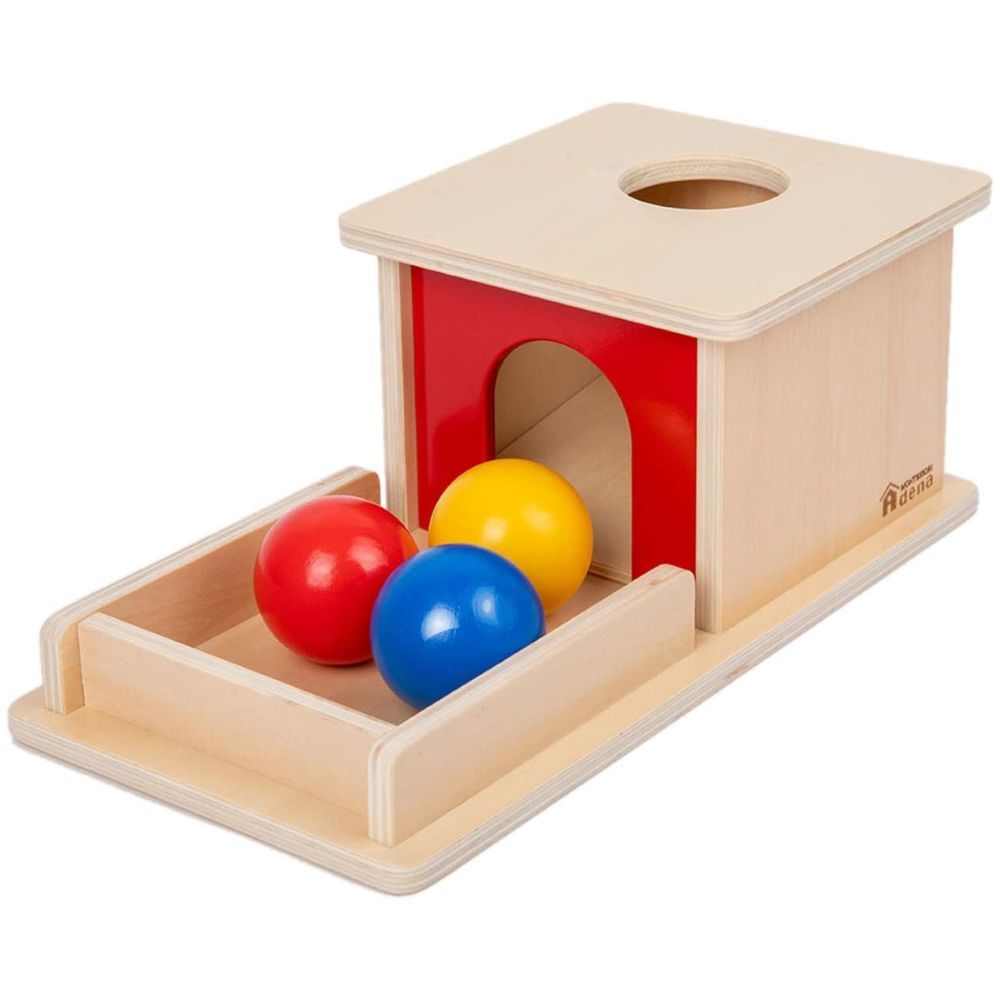
An object permanence box is a classic Montessori school learning tool that can greatly benefit your child's cognitive development.
It's typically a small wooden box with a hole on top and a tray at the front. Included in the box is usually a small ball or object.
The main idea is simple yet powerful: your child drops the ball into the hole, it disappears for a moment, and then reappears in the tray.
This activity helps your child understand the concept of object permanence—the understanding that objects continue to exist even when they cannot be seen, heard, or otherwise sensed. This is a fundamental concept in the cognitive development of children.
Benefits of using an Object Permanence Box include:
- Cognitive Development: Understanding object permanence is a significant cognitive milestone. It forms the basis for the development of other skills like memory, problem-solving, and logical thinking.
- Motor Skill Development: The act of grasping the ball, placing it into the hole, and retrieving it from the tray helps refine fine motor skills and hand-eye coordination.
- Independence and Confidence: As children master the concept of object permanence, they gain a sense of control over their environment, boosting their self-confidence and independence.
- Concentration: The repetitive action of the activity aids in developing focus and concentration.
Wooden Ring Stacker
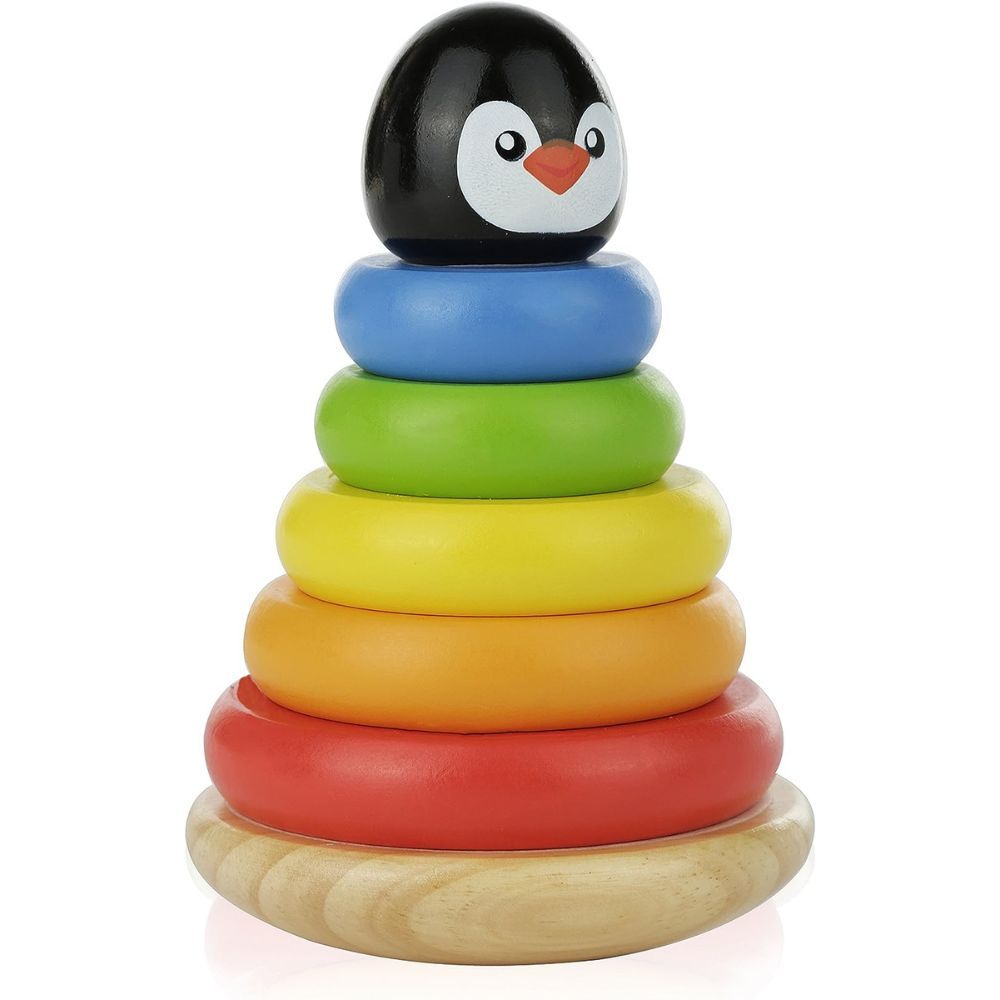
A Wooden Ring Stacker is a classic child's toy that consists of a wooden pole and various-sized rings.
The rings are stacked on the pole, typically in order from largest to smallest. This simple yet engaging toy offers a multitude of benefits for a child's development.
- Boosts Hand-Eye Coordination: By stacking the rings on top of each other, children develop a connection between their arms, hands, and fingers, enhancing their hand-eye coordination.
- Enhances Fine and Gross Motor Skills: The act of grasping the rings and placing them on the pole helps improve both fine motor skills (small movements like picking up small objects) and gross motor skills (bigger movements like crawling or walking).
- Promotes Problem-Solving Abilities: Children learn to solve the problem of which ring fits where promoting logical thinking and problem-solving abilities.
- Teaches about Size and Order: The rings' different sizes help children understand the concept of size and the basics of sequencing (which ring is bigger/smaller, which comes first/last).
- Stimulates Both Sides of the Brain: A wooden ring stacker activates a child's right brain (creative, visual perception) and left brain (logical, analytical thought) simultaneously.
- Encourages Independent Play: Playing with a wooden ring stacker can keep a child entertained and engaged, encouraging self-supported play.
Wooden Egg in a Cup
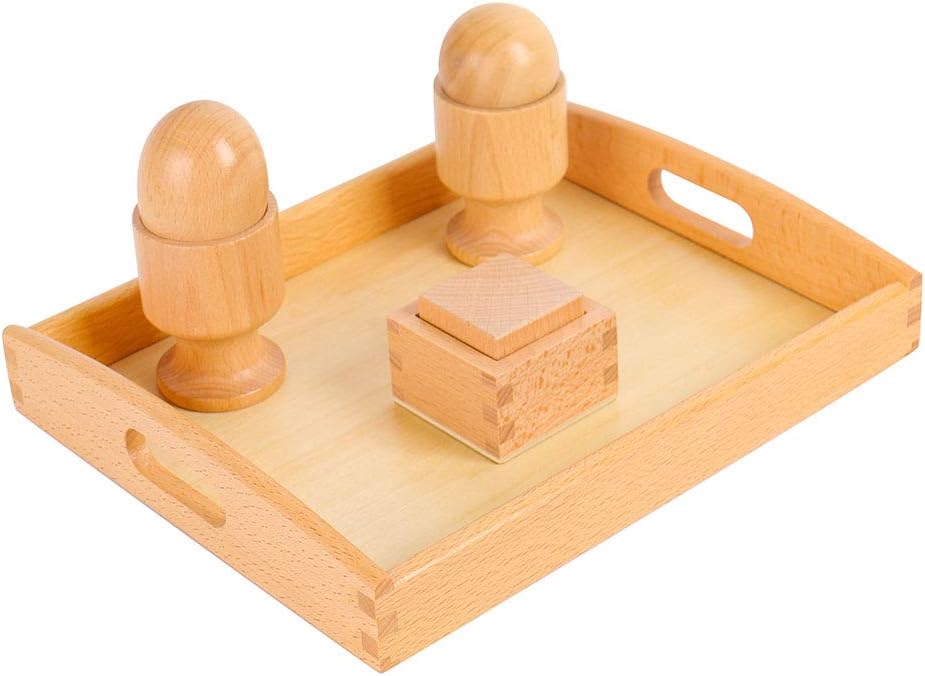
The "Wooden Egg in a Cup" is a simple yet effective Montessori learning material designed for babies who can comfortably move around and use both hands.
It consists of a wooden egg and a matching cup, creating a perfect first puzzle for infants, especially those around 8-9 months old.
The benefits of this seemingly straightforward toy are quite impressive:
- Hand-eye Coordination: The primary aim of the wooden egg and cup is to enhance your child's hand-eye coordination. The activity of fitting the egg into the cup requires precise movements and keen observation.
- Fine Motor Skills: As your child tries to fit the wooden egg into the cup, they are developing their fine motor skills. This activity encourages an intentional grasp, which is crucial for tasks like writing in the future.
- Problem-Solving: Each time your baby attempts to fit the egg into the cup, they're engaging in problem-solving. They learn through trial and error, which is fundamental for cognitive development.
- Bilateral Coordination: This toy presents an opportunity for your child to explore the use of both hands working together, which is known as bilateral coordination. This skill is essential for various daily activities, like dressing and eating.
- Focus and Concentration: Lastly, the wooden egg and cup also encourage the development of focus and concentration. The task requires patience and attention, promoting prolonged engagement.
How Self-Sufficient Play Aids in Your Baby's Development
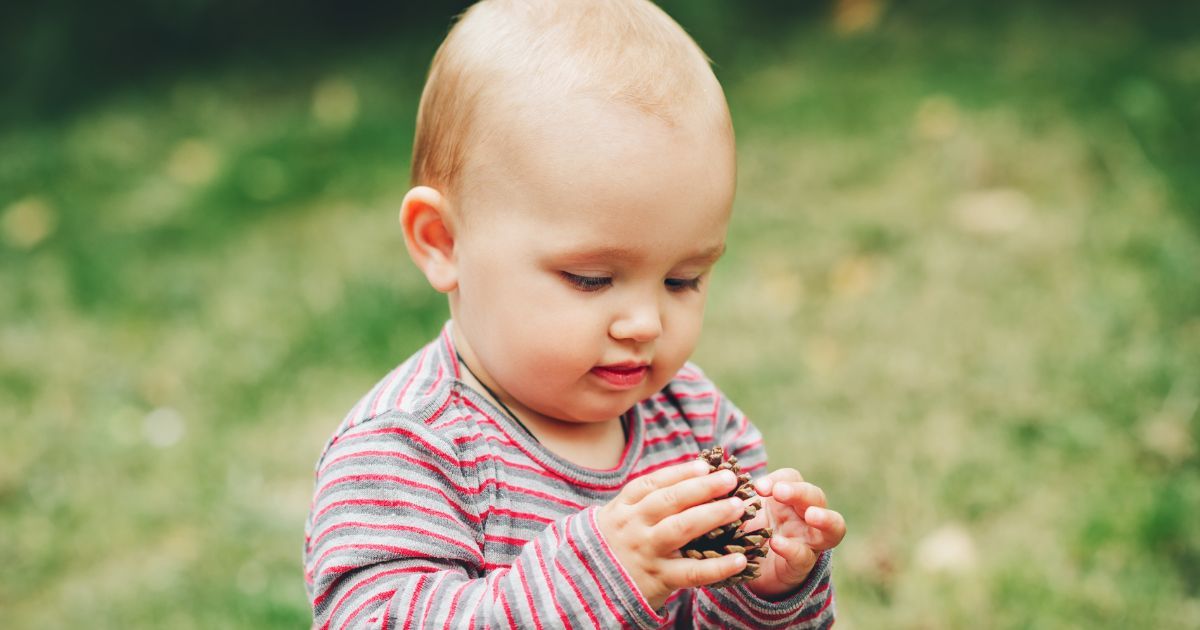
Independent play, also known as solitary play, is an essential part of your baby's development.
It's more than just a way to keep your little one entertained—it’s a critical learning experience that fosters a range of developmental skills.
So, let's delve deeper into the benefits of unconventional play for your baby!
- Boosts Cognitive Growth: First and foremost, unfettered play is a powerful stimulator for cognitive growth. As your baby engages with different toys, they're also exploring concepts like cause and effect, spatial relationships, and problem-solving. For instance, when your baby stacks blocks, they're not just playing—they're learning about balance, shapes, and gravity.
- Develops Creativity and Imagination: Individualistic play unleashes your baby's creativity and imagination. When left to their own devices, babies often come up with unique ways to interact with their toys. This imaginative play is a precursor to creative thinking and problem-solving skills they'll use later in life.
- Fosters Emotional Growth and Self-Regulation: Playing alone gives your baby the opportunity to manage their emotions and behaviors independently. It allows them to experience frustration, joy, and a range of other emotions in a safe environment, helping them learn to regulate these feelings.
- Promotes Autonomy and Independence: When your baby plays independently, they're learning to entertain themselves and make decisions without relying on others. This sense of autonomy is a crucial step toward developing independence and self-reliance.
- Helps Develop Preferences and Interests: As your baby experiments with different toys and activities, they'll start to develop their own preferences and interests. Independent play helps them discover what they enjoy doing, fostering a sense of identity and personal preference.
Independent play is much more than just a fun activity—it's a key part of your baby's development.
By providing a safe, stimulating environment for self-supporting play, you're not only keeping your baby entertained but also laying the groundwork for a host of important skills they'll use throughout their life.
Frequently Asked Questions
What are the skills of a 9-month-old in Montessori?
At around nine months, a Montessori baby is honing skills like language development, movement, and hand-eye coordination.
They are also exploring activities that boost fine motor skills, sensory play, and self-confidence. Furthermore, they engage in gross motor activities such as pulling up, kneeling, and standing upright.
What are the homemade Montessori activities for 9-month-old?
Homemade Montessori activities for a 9-month-old can include a DIY sensory texture board for tactile exploration and a homemade ring rattle that promotes fine motor skills.
You can also create a treasure basket filled with safe household items for your baby to discover, aiding in sensory play and cognitive development.
How to play with 9-month-old baby Montessori?
Playing with a 9-month-old baby using Montessori principles is a fun and educational experience. Start with simple activities like allowing your baby to explore the textures and tastes of food by self-feeding.
Engage in sensory play with toys or musical instruments, and use a rolling ball toy to encourage movement. Remember, the key is to allow your child to explore and learn at their own pace.
What can I teach a 9-month-old?
At 9 months old, you can engage your baby in activities to boost language skills, like naming objects and waiting for their response.
You can also play games such as "peek-a-boo" and "this little piggy" to encourage social interaction. Lastly, enhancing motor skills with toys and activities like rolling a ball or encouraging crawling can be beneficial.
What words should my 9-month-old be saying?
A 9-month-old baby typically begins to babble words like 'mama' and 'dada'.
They start to understand simple words such as 'no', respond to their name and may use sounds or gestures to express needs. However, these are not yet real words and are more of an exploration of sounds.
What motor skills should a 9-month-old have?
At nine months, babies typically start showing significant motor skills development. They gain the ability to sit without support, crawl, and transition in and out of sitting positions.
Additionally, their hand-eye coordination improves, enabling them to move objects from one hand to another and use both hands to explore toys.
What are developmental red flags for a 9-month-old?
Developmental red flags for a 9-month-old include not being able to sit (even with support), not bearing weight on legs, or babbling words like "baba", "mama", and "dada".
A baby that doesn't respond to their name, look where you point, or engage in back-and-forth sharing of sounds or expressions might also be cause for concern.
If your baby doesn't show any progress in crawling or can't stand even when supported, it's important to consult a healthcare professional.
What can I do with my 9-month-old all day?
To keep your 9-month-old busy all day, try introducing various activities. Start with sensory baby play like experimenting with textures or having fun with Jell-O.
Engage them in motor skill games such as crawling on different surfaces or playing with a medium-sized ball. You can also enhance their social skills with sing-along games and simple games like "peek-a-boo".
How verbal should a 9-month-old be?
A 9-month-old baby typically babbles consonant sounds like 'baba', 'mamma', and 'dadada'.
They begin to understand simple words like 'no' and can make a variety of different sounds. Some babies might even be preparing to say their first real words.
Final Thoughts
Montessori activities offer a wealth of benefits for your nine-month-old.
From boosting self-confidence and independence through self-feeding to promoting cognitive and physical development through individualistic play, the impact is profound. You will also prepare your baby for the Montessori classroom.
So, why wait? Start incorporating these activities into your baby's routine today. You'll be amazed at how quickly they learn and grow!
Remember, every baby is unique and develops at their own pace. So, don't worry if your little one takes a bit longer to master these activities.
The key is to keep encouraging them and celebrating their progress. As always please feel free to share your baby's favorite toys. Happy parenting!
Before You Go...
